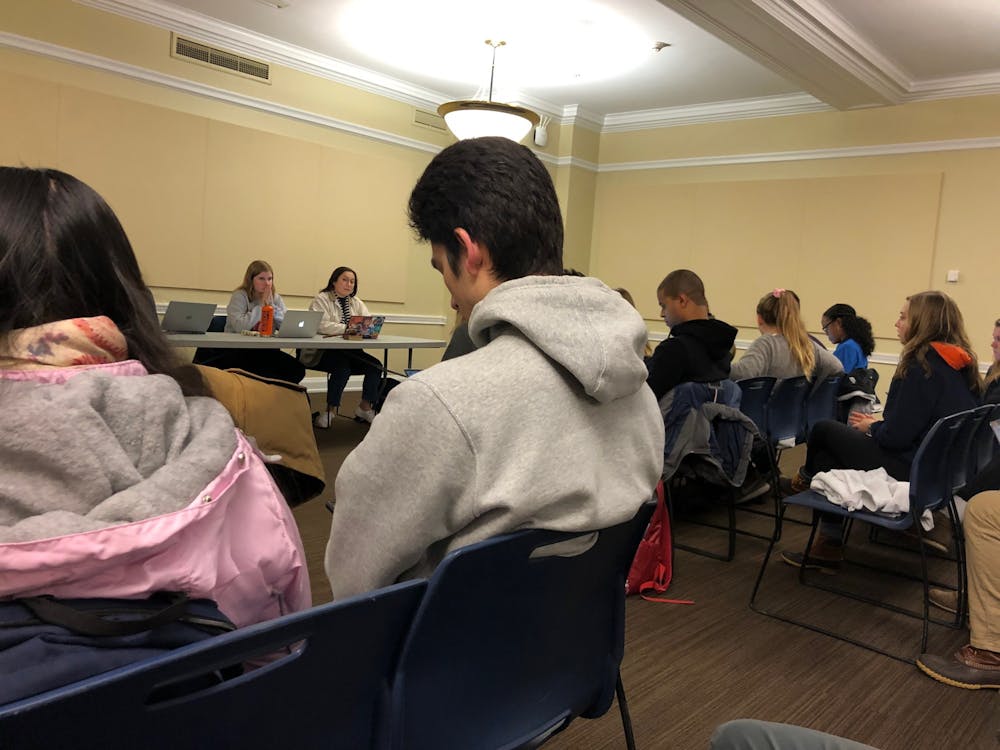Student Council unanimously passed a resolution calling on the University to provide free STI testing and a bill to approve newly created Contracted Independent Organizations at its weekly meeting Tuesday evening. A bill to create an ad-hoc committee to support student workers also passed with 24 yays and one abstention.
FR19-18 is a resolution aimed to voice Student Council’s support for free, available STI testing at the Elson Student Health Center — beyond the 70 free tests that Student Council previously announced they would provide for students at the end of the fall semester. Currently, getting testing for chlamydia and gonorrhea, the two most common STIs for college students, costs $30 at the Elson Student Health Center.
HISE, or Hoos for Inclusive Sexual Education, is a group of students advocating for LGBTQ inclusive sexual education on Grounds, part of which is encouraging the deconstruction of barriers to sexual health, such the costs for STI tests. The group released a petition Monday calling on the University to “implement a free-of-charge system at student health for STI testing.” The petition has nearly 200 signatures as of press time.
“We believe that with the weight of classes, extracurriculars and everything else, students should not be stressed about knowing their status,” said Hunter Wagenaar, a third-year College student and founder of HISE. “There should not be a socio-economic disparity in who can and cannot get tested. We have taught hundreds of students in the past year that part of being socially responsible is getting tested, and that it's somewhat of a necessity, so how can we promote and necessity when it's treated like a commodity?”
Aneesha Goodala, a second-year College student and author of the resolution to voice support for free STI testing, explains that although a resolution cannot sanction any physical action, it is useful in voicing support for the cause which can then ultimately lead to change.
“What a resolution does is that it basically gives Student Council support and is used as a kind of leverage tool to talk to administration,” Goodala said. “It in no way mandates any kind of actual action because we don't have the power to do that, but I wanted to write this resolution because I think it's really important to reduce the barriers that students currently have in accessing STI testing, and I think it's really important that we at least start the conversation with administration and talk about ways that we can reduce these barriers.”
FB19-19 also passed unanimously, approving six newly created CIOs. CIOs are organizations that act independently of the University and can offer, but are not limited to, education, hobby, professional, recreational and service opportunities for students. The newly created CIOs ranged widely in scope, consisting of the Naval ROTC, Hot Sauce Club, Doctors Without Borders, Broadway Talks Back, National Teeth and a human powered vehicle design club.
Many clubs wish to seek CIO status due to a number of benefits that the title affords, including the ability to receive Student Activity Fee funding from the Student Council and the ability to reserve spaces through the SOURCE, the University’s database of available academic and student activity spaces.
“So one of the three main benefits is being able to book spaces through the SOURCE,” said Ellie Brasacchio, Student Council president and a fourth-year College student. “Being able to be eligible for SAF funding from Student Council, being eligible for storage allocations … [and] being able to participate in the activities fair at the beginning of the year.”
FB19-20, a bill to create an ad-hoc committee to support student workers, also passed Tuesday. An ad-hoc committee is formed for a specific objective and is usually dissolved after the completion of the achievement of the objective.
Ellen Yates, a third-year College student and Student Council vice president for administration, spoke about the bill at the meeting, saying it would address student working conditions.
“The intentions for the ad-hoc committee are to explore and investigate the conditions that student workers face, but a couple of the specific things we’re looking at is the Student Worker Category,” Yates said. “So as we understand it right now, students can be paid less for working the same jobs and the same number of hours as non student employees because of the Student Worker Category.”
In May, student staff members at Newcomb Hall petitioned against changes that resulted from the reorganization of Newcomb Hall. These changes — which have included hiring freezes and increased responsibilities without increased pay — were due to a budget deficit in the Office of the Dean of Students. Impacted student employees held a rally at the steps of Peabody Hall to protest the changes.
“We're also going to be examining whether the conditions for student workers are compatible with the student rights laid out by the Office of the Dean of Students and other things like that, just to find ways that we can better advocate for student workers and include them in the decision making process,” Yates said.
Correction: This article previously misstated that Hunter Wagenaar is a Student Council representative, and has been updated.







